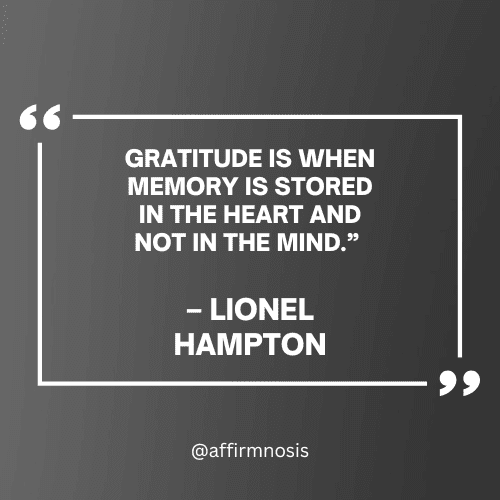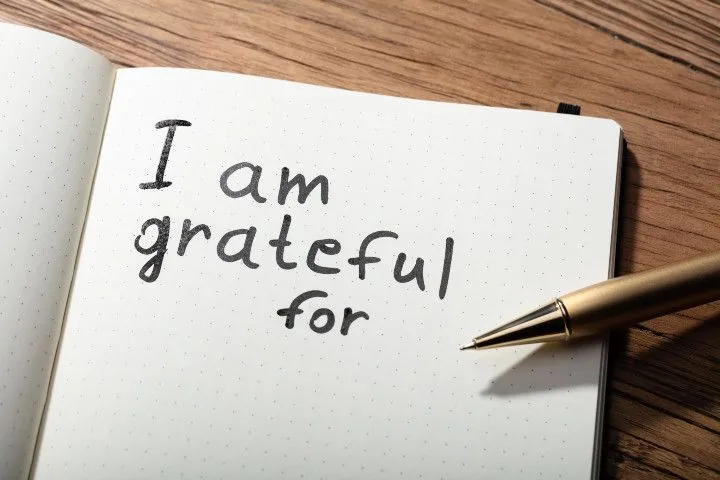Have you ever felt overwhelmed by the challenges and difficulties of life? Have you struggled to find meaning and purpose in your daily activities? If so, you are not alone.
In today’s fast-paced, stressful world, many people find it difficult to stay centered and grounded amidst the chaos. One powerful tool that can help you cultivate a sense of calm and positivity is gratitude journaling.
This practice involves reflecting on the things in your life that you are grateful for, and writing them down in a journal. While it may seem like a simple exercise, the benefits of regularly practicing gratitude journaling are profound.
Explanation of Gratitude Journaling
At its core, gratitude journaling is about cultivating a mindset of thankfulness and appreciation. By taking time each day to focus on the positive aspects of your life – whether they be big or small – you can shift your perspective towards one of abundance rather than scarcity.
To begin this practice, all you need is a notebook or journal where you can record your thoughts. It can be as simple or elaborate as you’d like; what matters most is that it feels comfortable for you.
Benefits of Gratitude Journaling
The benefits of regularly practicing gratitude journaling are numerous. First and foremost, it can help reduce stress and improve overall well-being. Studies have shown that people who engage in regular gratitude practices experience lower levels of depression and anxiety than those who do not.
Furthermore, expressing appreciation for the good things in our lives has been linked to increased feelings of happiness and contentment. By focusing on what we have rather than what we lack, we can experience more joy in our day-to-day lives.
Gratitude has been shown to enhance our relationships with others. When we take time to acknowledge and express gratitude for the people in our lives, we strengthen our connections and build deeper bonds.
Importance of Practicing Gratitude
In a world that often seems obsessed with striving for more, practicing gratitude can be a powerful antidote.
By cultivating a sense of appreciation for what we already have, we can shift our focus away from constantly needing to acquire more possessions or accomplishments. Furthermore, gratitude can help us stay centred during difficult times.
When we face challenges or setbacks, it can be easy to forget about the good things in our lives. Practicing gratitude journaling helps us maintain perspective and stay grounded in the present moment.
In short, practicing gratitude is an essential part of living a fulfilling life. By taking time each day to reflect on the things we’re thankful for, we can cultivate a deep sense of contentment and joy that will sustain us even during life’s most challenging moments.
How to Start Gratitude Journaling
Practicing gratitude journaling is an effective way to cultivate a positive mindset and boost your mental health. If you’re new to the practice, getting started can be daunting. Here are some tips on how to start gratitude journaling:
Choosing a Journal
The first step in starting a gratitude journal is choosing the right notebook or journal. There are many options available, from plain notebooks to beautifully designed journals specifically for gratitude writing. Ultimately, the choice of journal comes down to personal preference and what inspires you.
Some people prefer a plain notebook that they can personalize with stickers and drawings, whereas others prefer journals with prompts or pre-designed pages.
A good option for beginners is a guided gratitude journal with simple prompts that help you get started.
Setting aside time for journaling
To make the most out of your gratitude practice, it’s important to set aside time each day for reflection and writing. This could be as little as five minutes in the morning or before bed. It’s also helpful to choose a quiet and comfortable space where you can focus on your thoughts without distractions.
For some people, this might be at home in their bedroom or living room, whereas others might find it helpful to go outside and find a peaceful spot in nature.
Remember that consistency is key when it comes to practicing gratitude journaling – even if you only have a few minutes each day, make sure you stick with it!
Starting with simple prompts
If you’re new to gratitude journaling, it can be helpful to start with simple prompts that guide your writing. This could include writing about three things you’re grateful for each day or reflecting on positive experiences from the day before.
Another great prompt is asking yourself “what went well today?” and writing about any positive experiences from the past 24 hours. This helps shift your focus to the good things in your life and makes it easier to appreciate them.
As you get more comfortable with gratitude journaling, you can start exploring other prompts that resonate with you and even come up with your own!
The key is to make sure that each prompt inspires positive reflection and helps you cultivate gratitude.
The Science Behind Gratitude Journaling
Positive Psychology and Gratitude
Positive psychology is the scientific study of human thoughts, emotions, and behaviours with a focus on the positive aspects of life. It has been found that practicing gratitude is one of the most effective ways to promote well-being and happiness.
According to research in positive psychology, gratitude helps us to appreciate the goodness in our lives, which in turn enhances our positivity and overall sense of well-being.
Gratitude can help individuals focus on what they have instead of what they lack.

This shift in focus has been linked to increased feelings of optimism, happiness, and self-esteem.
Gratitude has also been found to increase social connections as people who practice gratitude may be more willing to reach out for support or express appreciation for others.
The Impact on Mental Health and Well-being
Several studies have shown that practicing gratitude journaling can lead to significant improvements in mental health outcomes such as depression, anxiety, stress levels, and sleep quality.
By focusing on positive experiences through journaling, people can reflect on things that make them happy or bring them joy which can be especially helpful during challenging times.
A study published in the Journal of Personality and Social Psychology found that participants who wrote about things they were grateful for experienced fewer physical symptoms than those who did not write about gratitude.
Another study showed that participants who kept a daily gratitude journal for just two weeks reported better sleep quality than those who did not keep a journal.
Studies on the Effects of Gratitude Journaling
Numerous studies have been conducted over the years aimed at understanding the effects of gratitude journaling.
For example, a 2006 study published in Behaviour Research & Therapy showed that writing letters expressing thanks led to increased levels of happiness among participants.
Another study published in Applied Psychology: Health and Well-Being investigated if the effects of gratitude journaling were long-lasting.
The study found that participants who continued to practice gratitude journaling even after the study was over, maintained their benefits and experienced sustained improvements in well-being.
In addition, a study published in the Journal of Happiness Studies found that people who kept a daily gratitude journal reported more positive emotions and had higher levels of life satisfaction than those who did not keep a journal.
The science behind gratitude journaling is ever-growing, as researchers continue to explore and uncover its many benefits. Practicing gratitude has been found to improve mental health, increase happiness levels, and enhance social connections.
Incorporating gratitude into your daily routine through a simple practice such as keeping a gratitude journal can be an effective way to promote overall well-being.
Techniques for Effective Gratitude Journaling
Focusing on the Present Moment: Cultivating Mindfulness in Your Journal
One of the most important techniques for effective gratitude journaling is to focus on the present moment. This means being fully aware and engaged in your current surroundings and experiences.
By staying present, you’re able to fully connect with the positive aspects of your day and reflect on them more deeply.
To cultivate mindfulness in your gratitude journal, consider setting aside a few minutes each day to focus on your breath. Take deep inhales and exhales while centering yourself in the moment.
When beginning to write, try to let go of any distractions or racing thoughts that may be clouding your mind. Stay focused on what’s currently happening around you – whether it’s the sound of birds chirping outside or the warmth of a cup of coffee in your hand.
Reflecting on Daily Experiences: Finding Gratitude in Mundane Moments
Reflecting on daily experiences is another powerful technique for effective gratitude journaling. This involves taking note of even the most mundane moments that bring positivity into your life. For example, did you have a pleasant conversation with a coworker today?
Did you take a walk outside during lunchtime? These are seemingly small experiences that can easily be taken for granted, but they hold value when reflecting on what brings joy into our lives.
When reflecting on these daily experiences, try to write down specific details about what happened and why it brought joy or positivity into your life. Consider writing about how it made you feel or how it impacted other areas of your day.
Writing in Detail About Specific Moments: Digging Deeper Into Grateful Experiences
In addition to focusing on present-moment awareness and daily reflections, writing in detail about specific moments is another technique for effective gratitude journaling.
This involves digging deeper into specific experiences that brought gratitude into your life. Reflect on moments that made you feel especially joyful, grateful, or humbled.
When writing about these specific moments, try to incorporate sensory details to fully immerse yourself in the experience. What did you see, hear, smell, taste or touch?
How did it make you feel emotionally and physically? By writing in detail about these moments, you’re able to relive them in a more profound way and strengthen your connection to gratitude.
Incorporating these techniques – focusing on the present moment, reflecting on daily experiences and writing in detail about specific moments – can help make your gratitude journaling practice more effective and impactful.
By staying mindful of what brings joy into our lives and reflecting on it through writing, we are able to cultivate a deeper sense of gratitude that can positively impact our overall well-being.
Overcoming Challenges in Gratitude Journaling
One of the biggest challenges with gratitude journaling is staying consistent. While it may seem easy to write down a few things you are grateful for one day, it can be difficult to maintain this practice over time.
Staying consistent with practice
To stay consistent, it’s important to make gratitude journaling a part of your daily routine. Set aside a specific time each day to write in your journal.
It doesn’t have to be long – just five or ten minutes each day can make a difference. Another way to stay consistent is to make sure your gratitude journal is easily accessible.
Keep it in a visible place where you will see it every day, such as on your bedside table or next to your computer at work. This will serve as a visual reminder and encourage you to write in it daily.
Dealing with negative emotions or experiences
It’s natural to experience negative emotions and experiences from time to time, even when practicing gratitude journaling. When this happens, try not to ignore these feelings but instead use them as an opportunity for growth and reflection.
Start by acknowledging the negative experience or feeling and then identifying something positive that came out of it. For example, if you had an argument with a friend, reflect on what led up to the argument and what you learned from the experience.
Another strategy is reframing negative experiences into opportunities for growth or lessons learned. This involves looking at challenging situations through a different lens and finding meaning or benefit in them.
Creating a routine that works for you
Everyone has different schedules and preferences when it comes to their daily routines. The key is finding what works best for you and incorporating gratitude journaling into that routine. Some people prefer writing in their journals first thing in the morning while others prefer doing so just before bed.
Experiment with different times of day and see what feels most natural to you. It’s also important to make your gratitude journaling routine enjoyable.
This could mean using a journal that you love or incorporating other activities, like meditation or listening to calming music, into your routine. The goal is to create a routine that you look forward to and that feels like a relaxing and rewarding part of your day.
Making Gratitude Journaling A Lifelong Habit
It takes time and effort to develop new habits, including gratitude journaling. To ensure this practice becomes a lifelong habit, it’s important to set realistic goals for yourself and celebrate small accomplishments along the way.
For instance, if you want to write in your gratitude journal every day for the next month, start with setting milestones for the first week or two, then work up from there.
Another approach is making it easier by starting small initially but gradually working up towards larger goals over time.
For example, start with writing down three things you are grateful for each day but increase it incrementally over time until you’re writing about more aspects of life that you’re grateful for.
Ultimately, remember why you started practicing gratitude journaling in the first place – focus on all the benefits it brings into your life such as increased happiness, improved mental health and better relationships.
Keeping these benefits in mind will help keep motivation levels high when faced with challenges along the way.
Incorporating gratitude into daily life beyond just journaling
While keeping a gratitude journal can be an effective way to cultivate positivity and well-being, there are many other ways to practice gratitude in our daily lives.
One simple technique is to make an effort to say “thank you” more often – whether it’s thanking someone for holding the door open or expressing appreciation for a co-worker’s help on a project.
Another way to incorporate gratitude into your daily routine is by taking time each day to reflect on what you’re thankful for – whether it’s during your morning coffee or before bed at night.
You might also consider volunteering or performing acts of kindness for others as a way to express your appreciation for all that you have.
Ultimately, the key is finding practices that work best for you and your unique circumstances. By incorporating gratitude into our daily lives, we can cultivate a more positive and fulfilling existence.
Gratitude as a Way of Life
Gratitude journaling is just one way to practice gratitude – but it’s important to remember that gratitude is more than just an activity or task. Rather, it’s a way of life that involves cultivating a deep sense of appreciation for all that we have, both big and small.
One powerful technique for fostering a grateful mindset is to make a habit of noticing the good things in your life – even when things are tough. This might involve reflecting on moments of kindness or joy throughout the day, or simply taking time to appreciate the beauty in nature or the people around you.
Another key aspect of living gratefully is recognizing the interconnectedness of all things. By acknowledging our dependence on others and the world around us, we can cultivate a greater sense of humility and interconnectedness.
This can help us feel more grounded, present, and connected to our own lives as well as those around us. Ultimately, gratitude journaling is just one tool in our toolkit for cultivating gratitude – but by making an effort to live gratefully each day, we can experience greater happiness, well-being, and fulfilment in all aspects of our lives.
Conclusion
Starting a gratitude journal is easy. All you need is a pen and paper or an app on your phone.
Choose a time of day that works best for you, whether it’s in the morning or before bed. Start with small prompts like “what am I grateful for today?” and work your way up to reflecting on specific experiences in more detail.
Start Practicing Gratitude
It’s never too late to start practicing gratitude. No matter what challenges you may face in life, there is always something to be thankful for.
By regularly journaling about the things you are grateful for, you can train your brain to focus on the positive aspects of life instead of dwelling on negative thoughts. Incorporating gratitude into daily life beyond just journaling can also have immense benefits.
You can express thanks to others verbally or through written notes, practice mindfulness meditation focused on appreciation and thankfulness or performing small acts of kindness throughout the day.
Remember that gratitude is contagious; when you show appreciation towards others it often inspires them to do the same towards someone else creating a ripple effect leading us towards positivity..
So why not give it a try? Start your own gratitude journal today and see how it can transform your perspective on life.
Quotes from notable individuals on the practice of gratitude:
- “Gratitude turns what we have into enough.” – Melody Beattie
- “Gratitude is a powerful catalyst for happiness. It’s the spark that lights a fire of joy in your soul.” – Amy Collette
- “Gratitude is the healthiest of all human emotions. The more you express gratitude for what you have, the more likely you will have even more to express gratitude for.” – Zig Ziglar
- “Gratitude makes sense of our past, brings peace for today, and creates a vision for tomorrow.” – Melody Beattie
- “Gratitude is not only the greatest of virtues, but the parent of all the others.” – Cicero
- “The root of joy is gratefulness.” – David Steindl-Rast
- “Gratitude is when memory is stored in the heart and not in the mind.” – Lionel Hampton
- “Gratitude is the fairest blossom which springs from the soul.” – Henry Ward Beecher
- “Gratitude is an antidote to negative emotions, a neutralizer of envy, hostility, worry, and irritation. It is savoring; it is not taking things for granted; it is present-oriented.” – Sonja Lyubomirsky
- “Gratitude is the sweetest thing in a seeker’s life – in all human life. If there is gratitude in your heart, then there will be tremendous sweetness in your eyes.” – Sri Chinmoy
These quotes emphasize the transformative power of gratitude and its ability to bring joy, peace, and abundance into our lives.




























































